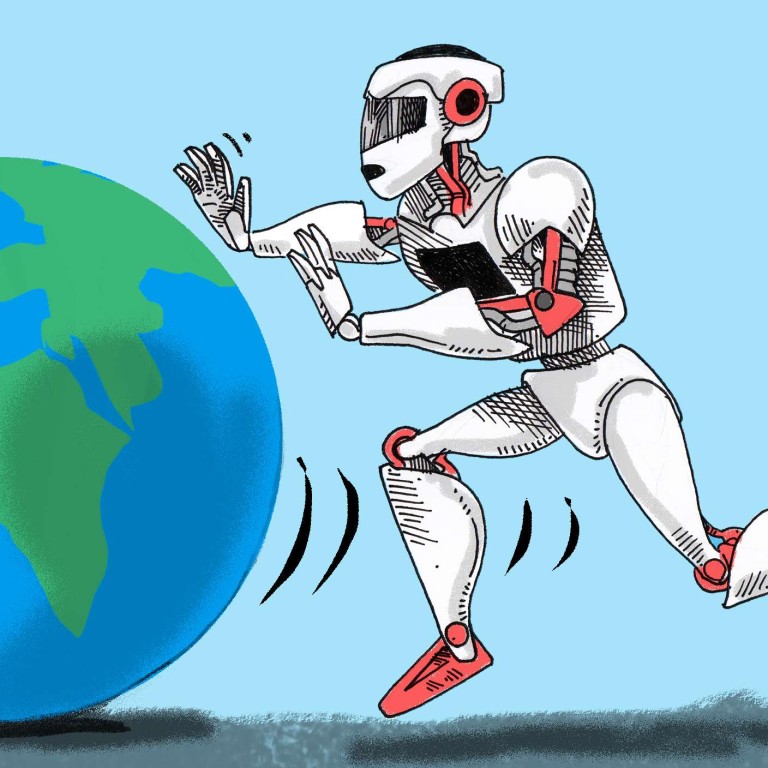
Two forces of change that threaten Hong Kong jobs
Janet Pau identifies global trends that should worry those steering the Hong Kong economy: a reversal of globalisation, in favour of protectionism, and technological advancements that are making traditional jobs obsolete

First, the global economy is facing a trend of “deglobalisation”. Trade growth is at its lowest since the global financial crisis in 2008, due in part to weaker global demand and slowing investment. Given the antiglobalisation sentiments that led to Britain’s vote to leave the European Union and the election of Donald Trump in the US, the outlook is likely to remain bleak. Protectionism is on the rise. In addition, Hong Kong is also vulnerable to slowing growth in the Chinese economy, as it makes a transition to a consumption-led model. Jobs in industries supporting trade and investment are at risk as a result.
Job prospects for new Hong Kong graduates decline

Why 2017 will be Asia’s year for artificial intelligence
According to a University of Warwick study, it is technically possible to automate a third to half of all current jobs. In Hong Kong, the impact on jobs can be directly felt in the banking and finance industry, where fintech, or financial technology, is on the rise. The automation and digitisation of industries in China also has knock-on effects on jobs in transport, logistics, retail and business services in Hong Kong.
Don’t fear the robots; they won’t kill jobs
As Hong Kong navigates this era of uncertainty, a new social compact needs to be forged, addressing the interests and needs of those who are left behind or experiencing downward mobility. When whole categories of jobs and whole industries are being eliminated, displaced middle-class workers, and even young graduates and professionals, will struggle to make ends meet. A programme to provide temporary basic income could be piloted on a diverse group, including employed and unemployed people, followed by analysis of how it affects recipients’ financial health and behaviour. Funding could come from venture capital, crowdfunding, and savings from reductions in social programmes with redundant benefits.
While technology should be embraced and adopted, it also needs to serve people broadly and not just a small group of winners
In addition, businesses can be encouraged to set up corporate universities that retrain workers for jobs that are needed
On the technology front, start-up activity in Hong Kong is increasingly vibrant and attracting global talent.
However, as demonstrated in Silicon Valley, the digital technology industry has created only a small fraction of jobs compared to traditional industries with far lower market capitalisation. The industry generates wealth but not sufficient employment, especially for less-skilled workers.
While technology should be embraced and adopted, it also needs to serve people broadly and not just a small group of winners.
Hong Kong-based technology enterprises that have multiplier effects on jobs – especially jobs outside the technology sector and outside the central business districts in the city – could be given tax incentives. These could then be channelled into partnership initiatives with elected officials in the districts and community organisations to create stable and meaningful jobs.
Watch: Inside the world’s most automatic and intelligent wheel plant
‘New mentality’ needed to support innovation and technology in Hong Kong, CY says in final policy address
A greater focus should also be given to sectors that will generate jobs requiring human interaction, intuition and imagination, and yield broad societal benefits in different sectors, including health care, education, and the environmental and cultural industries. More health care professionals and caregivers are needed to look after patients in the public health system and the elderly in private homes; more teachers and teaching assistants are needed to enable more personalised learning; more environmental workers ranging from researchers to urban farmers are needed to create a greener city; and more creative people should be engaged to foster global and local culture that embody shared and diverse interests.
As a small economy, Hong Kong has always relied on openness and connectivity to larger economies in the region and the world. It needs to stay the course and continue to embrace openness, and expand ties with new markets beyond China and the West, including Southeast Asian nations and India.
The coming era of greater instability of the global economic order may be a “dark winter” that Hong Kong needs to live through. The new leader of the city will need to confront realities brought about by the forces of change, lift up the vulnerable, and invest in shared prosperity at a time of great transition.
Janet Pau is programme director of the Asia Business Council

